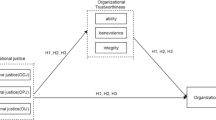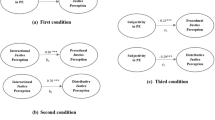Abstract
In this paper, the authors intend to show that justice in management control systems is a requirement for generating goal congruence, trust in managers and perceptions of fairness among employees. We use a conceptual model that relates different kinds of justice, formal justice and informal justice, to different states of goal congruence and draw on research into trust and justice. The model is conceptually examined and is validated by using three samples and applying several methods of analysis, exploratory and confirmatory factor analyses, structural equation modeling and a study of several scenarios analyzed through ANOVA. We also conceptually develop and empirically test several hypotheses that enable us to draw the following conclusions regarding management control systems: trust is a consequence of informal justice; trust and justice together facilitate goal congruence and perceptions of fairness; and trust is both a consequence of justice and a generator of overall perceptions of fairness.


Similar content being viewed by others
References
Ahmad, A., Asgari, A., Silong, A. D., & Abu Samah, B. (2008). The relationship between transformational leadership behaviors, organizational justice, leader-member exchange, perceived organizational support, trust in management and organizational citizenship behaviors. European Journal of Scientific Research, 23(2), 227–242.
Ambrose, M. L., & Schminke, M. (2009). The role of overall justice judgments in organizational justice research: A test of mediation. Journal of Applied Psychology, 94(2), 491–500.
Anthony, R. N. (1988). The management control function. Boston, MA: Harvard Business School Press.
Anthony, R. N., Dearden, J., & Vancil, R. F. (1972). Management control systems. Homewood, IL: Richard D. Irwin.
Anthony, R. N., & Govindarajan, V. (2003). Management control systems (11th ed.). Homewood, IL: Richard D. Irwin.
Aristotle. (2009). The Nicomachean ethics. W.D. Ross, revised by Leslie Brown. Oxford: Oxford University Press
Arrow, K. J. (1974). The limits of organization. New York: Norton.
Aryee, S., Budhwar, P. S., & Chen, Z. X. (2002). Trust as a mediator of the relationship between organizational justice and work outcomes: Test of a social exchange model. Journal of Organizational Behavior, 23, 267–286.
Barnard, C. I. (1938). The functions of the executive. Cambridge, MA: Harvard University Press.
Blau, P. M. (1964). Exchange and power in social life. New York: Wiley.
Brockner, J., Siegel, P. A., Daly, J. P., Tyler, T. R., & Martin, C. (1997). When trust matters: The moderating effect of outcome favorability. Administative Science Quarterly, 42, 558–583.
Brockner, J., & Wiesenfeld, B. M. (1996). An integrative framework for explaining reactions to decisions: Interactive effects of outcomes. Psychological Bulletin, 120(2), 189–208.
Chang, S.-J., van Witteloostuijn, A., & Eden, L. (2010). From the editors: Common method variance in international business research. Journal of International Business Studies, 41(2), 178–184.
Chin, W. W. (1998). The partial least squares approach to structural equation modeling. In G. A. Marcoulides (Ed.), Modern methods for business research (pp. 295–358). Mahwah, NJ: Lawrence Erlbaum.
Chin, W. W. (2010). How to write up and report PLS analyses. In V. Esposito Vinzi, W. W. Chin, J. Henseler, & H. Wang (Eds.), Handbook of partial least squares: Concepts, methods and applications in marketing and related fields (pp. 655–690). Berlin: Springer.
Colquitt, J. A., & Rodell, J. B. (2011). Justice, trust, and trustworthiness: A longitudinal analysis integrating three theoretical perspectives. Academy of Management Journal, 54(6), 1183–1206.
Colvin, A. J. S., & Boswell, W. R. (2007). The problem of action and interest alignment: Beyond job requirements and incentive compensation. Human Resource Management Review, 17(1), 38–51.
Cropanzano, R. (Ed.). (2001). Justice in the workplace: From theory to practice. Mahwah, NJ: Lawrence Erlbaum.
Cropanzano, R., & Ambrose, M. L. (2001). Procedural and distributive justice are more similar than you think: A monistic perspective and a research agenda. In J. Greenberg & R. Cropanzano (Eds.), Advances in organizational justice (pp. 119–151). Stanford, CA: Stanford University Press.
Cropanzano, R., & Randall, M. L. (1993). Injustice and work behavior: A historical review. In R. Cropanzano (Ed.), Justice in the workplace: Approaching fairness in human resource management (pp. 3–20). Hillsdale, NJ: Lawrence Erlbaum.
Cugueró-Escofet, N., & Fortin, M. (2014). One justice or two? A model of reconciliation of normative justice theories and empirical research on organizational justice. Journal of Business Ethics, 124(3), 435–451.
Cugueró-Escofet, N., Fortin, M., & Canela, M.-Á. (2014). Righting the wrong for third parties: How monetary compensation, procedure changes and apologies can restore justice for observers of injustice. Journal of Business Ethics, 122(2), 253–268.
Cugueró-Escofet, N., & Rosanas, J. M. (2013). The just design and use of management control systems as requirements for goal congruence. Management Accounting Research, 24(1), 23–40.
Cugueró-Escofet, N., & Rosanas, J. M. (2015a). Justice: A sufficient condition for goal congruence in management control systems. European Accounting and Management Review, 2(2), 104–122.
Cugueró-Escofet, N., & Rosanas, J. M. (2015b). The social dynamics of justice: How ex ante and ex post justice interplay with formal and informal elements of management control systems. In S. W. Gilliland, D. D. Steiner, & D. P. Skarlicki (Eds.), Social dynamics of organizational justice (pp. 223–250). Charlotte, NC: Information Age Publishing.
Cugueró-Escofet, N., & Rosanas, J. M. (2016). The ethics of metrics: Overcoming the dysfunctional effects of performance measurements through justice. Journal of Business Ethics. https://doi.org/10.1007/s10551-016-3049-2.
Dasgupta, P. (1988). Trust as a commodity. In D. Gambetta (Ed.), Trust: Making and breaking cooperative relations (pp. 49–72). Oxford: Basil Blackwell.
De Jong, B. A., & Elfring, T. (2010). How does trust affect the performance of ongoing teams? The mediating role of reflexivity, monitoring, and effort. Academy of Management Journal, 53(3), 535–549.
Dirks, K. T., & Ferrin, D. L. (2002). Trust in leadership: Meta-analytic findings and implications for research and practice. Journal of Applied Psychology, 87(4), 611–628.
Drath, W. H., McCauley, C. D., Palus, C. J., Van Velsor, E., O’Connor, P. M. G., & McGuire, J. B. (2008). Direction, alignment, commitment: Toward a more integrative ontology of leadership. Leadership Quarterly, 19(6), 635–653.
Ferrin, D. L., & Gillespie, N. (2010). Trust differences across national-societal cultures: Much to do, or much ado about nothing? In M. N. K. Saunders, D. Skinner, G. Dietz, N. Gillespie, & R. J. Lewicki (Eds.), Organizational trust: A cultural perspective (pp. 42–86). Cambridge: Cambridge University Press.
Flamholtz, E. G. (1979). Organizational control systems as a managerial tool. California Management Review, 22(2), 5–69.
Folger, R. (1998). Fairness as a moral virtue. In M. Schminke (Ed.), Managerial ethics: Moral management of people and processes (pp. 13–34). Mahwah, NJ: Lawrence Erlbaum.
Folger, R., & Cropanzano, R. (1998). Organizational justice and human resource management. Beverly Hills, CA: Sage.
Fornell, C. G., & Larcker, D. F. (1981). Evaluating structural equation models with unobservable variables and measurement error. Journal of Marketing Research, 18(1), 39–50.
Frazier, M. L., Johnson, P. D., Gavin, M., Gooty, J., & Snow, D. B. (2010). Organizational justice, trustworthiness, and trust: A multifoci examination. Group and Organization Management, 35(1), 39–76.
Gambetta, D. (1988). Can we trust trust? In D. Gambetta (Ed.), Trust: Making and breaking cooperative relations (pp. 212–237). Oxford: Basil Blackwell.
Gefen, D., & Straub, D. W. (2005). A practical guide to factorial validity using PLS-Graph: Tutorial and annotated example. Communications of the Association for Information Systems, 16, 91–109.
Goldman, B. M., & Cropanzano, R. (2015). “Justice” and “fairness” are not the same thing. Journal of Organizational Behavior, 36(2), 313–318.
Gottschalg, O., & Zollo, M. (2007). Interest alignment and competitive advantage. Academy of Management Review, 32(2), 418–437.
Greenberg, J. (1990). Employee theft as a reaction to underpayment inequity: The hidden cost of pay cuts. Journal of Applied Psychology, 75, 561–568.
Greenberg, J. (2005). Losing sleep over organizational injustice: Attenuating insomniac reactions to underpayment inequity with supervisory training in interactional justice. Journal of Applied Psychology, 91(1), 58–69.
Greenberg, J., & Wiethoff, C. (2001). Organizational justice as proaction and reaction: Implications for research and application. In R. Cropanzano (Ed.), Justice in the workplace: From theory to practice (pp. 271–302). Mahwah, NJ: Lawrence Erlbaum.
Henseler, J., Ringle, C. M., & Sarstedt, M. (2015). A new criterion for assessing discriminant validity in variance-based structural equation modeling. Journal of the Academy of Marketing Science, 43, 115–135.
Johnson, P., & Gill, J. (1993). Management control and organizational behavior. London: Chapman.
Kreps, D. M. (1990). Corporate culture. In J. E. Alt & K. A. Shepsle (Eds.), Perspectives on positive political economy (pp. 90–143). New York: Cambridge University Press.
Langfield-Smith, K. M. (1997). Management control systems and strategy: A critical review. Accounting, Organizations and Society, 22(2), 207–232.
Lewicki, R. J., Tomlinson, E. C., & Gillespie, N. (2006). Models of interpersonal trust development: Theoretical approaches, empirical evidence, and future directions. Journal of Management, 32(6), 991–1022.
Lewicki, R. J., Wiethoff, C., & Tomlinson, E. C. (2005). What is the role of trust in organizational justice? In J. Greenberg & J. A. Colquitt (Eds.), Handbook of organizational justice (pp. 247–270). Mahwah, NJ: Lawrence Erlbaum.
Lind, E. A., & Tyler, T. R. (1988). The social psychology of procedural justice. New York: Plenum.
Lindell, M. K., & Whitney, D. J. (2001). Accounting for common method variance in cross-sectional research designs. Journal of Applied Psychology, 86, 114–121.
Martin, J., & Harder, J. W. (1994). Bread and roses: Justice and the distribution of financial and socioemotional rewards in organizations. Social Justice Research, 7, 241–264.
Mayer, R. C., Davis, J. H., & Schoorman, F. D. (1995). An integrative model of organizational trust. Academy of Management Review, 20(3), 709–734.
Merchant, K. A. (1985). Budgeting and the propensity to create budgetary slack. Accounting, Organizations and Society, 10(2), 201–210.
Miller, D. T. (2001). Disrespect and the experience of injustice. Annual Review of Psychology, 52, 527–553.
Mossholder, K. W., Bennett, N., Kemery, E. R., & Wesolowski, M. A. (1998). Relationships between bases of power and work reactions: The mediational role of procedural justice. Journal of Management, 24(4), 533–552.
Mulaik, S. A. (2009). Foundations of factor analysis. New York: Chapman & Hall/CRC.
Niehoff, B. P., & Moorman, R. H. (1993). Justice as a mediator of the relationship between methods of monitoring and organizational citizenship behavior. Academy of Management Journal, 36(3), 527–556.
Otley, D. T., & Berry, A. J. (1980). Control, organizations and accounting. Accounting, Organizations and Society, 5(2), 231–244.
Podsakoff, P. M., MacKenzie, S. B., & Lee, J.-Y. (2003). Common method biases in behavioral research: A critical review of the literature and recommended remedies. Journal of Applied Psychology, 88(5), 879–903.
Robinson, S. L. (1996). Trust and breach of the psychological contract. Administrative Science Quarterly, 41(4), 574–599.
Rosanas, J. M., & Velilla, M. (2005). The ethics of management control systems: Developing technical and moral values. Journal of Business Ethics, 57(1), 83–96.
Schminke, M., Ambrose, M. L., & Noel, T. W. (1997). The effect of ethical frameworks on perceptions of organizational justice. The Academy of Management Journal, 40(5), 1190–1207.
Schoorman, F. D., Mayer, R. C., & Davis, J. H. (2007). An integrative model of organizational trust: Past, present, and future. Academy of Management Review, 32(2), 344–354.
Simons, R. (1987). Accounting control systems and business strategy: An empirical analysis. Accounting, Organizations and Society, 12(4), 357–374.
Spector, P. E. (2006). Method variance in organizational research: Truth or urban legend? Organizational Research Methods, 9(2), 221–232.
Speklé, R. F., & Verbeeten, F. H. M. (2014). The use of performance measurement systems in the public sector: Effects on performance. Management Accounting Research, 25, 131–146.
Spreitzer, G. M., & Mishra, A. K. (1999). Giving up control without losing control: Trust and its substitutes’ effects on managers’ involving employees in decision making. Group and Organization Management, 24(2), 155–187.
Supeli, A., & Creed, P. A. (2014). The incremental validity of perceived goal congruence: The assessment of person-organizational fit. Journal of Career Assessment, 22(1), 28–42.
Thurston, P. W., Jr., & McNall, L. (2010). Justice perceptions of performance appraisal practices. Journal of Managerial Psychology, 25(3), 201–228.
Tyler, T. R., & Bies, R. J. (1990). Beyond formal procedures: The interpersonal context of procedural justice. In J. Carroll (Ed.), Applied social psychology and organizational settings (pp. 77–98). Hillsdale, NJ: Lawrence Erlbaum.
Van der Stede, W. A. (2000). The relationship between two consequences of budgetary controls: Budgetary slack creation and managerial short-term orientation. Accounting, Organizations and Society, 25(6), 609–622.
van Riel, C. B. M., Berens, G., & Dijkstra, M. (2009). Stimulating strategically aligned behaviour among employees. Journal of Management Studies, 46(7), 1197–1226.
Vancil, R. F. (1973). What kind of management control do you need? Harvard Business Review, 51, 75–86.
Vermunt, R. (2002). Employee stress, injustice, and the dual position of the boss. In S. W. Gilliland, D. D. Steiner, & D. P. Skarlicki (Eds.), Emerging perspectives on managing organizational justice (pp. 159–176). Greenwich, CT: Information Age Publishing.
Whitener, E. M., Brodt, S. E., Korsgaard, M. A., & Werner, J. M. (1998). Managers as initiators of trust: An exchange relationship framework for understanding managerial trustworthy behavior. Academy of Management Review, 23(3), 513–530.
Williamson, O. E. (1993). Calculativeness, trust, and economic organization. Journal of Law and Economics, 36(1), 453–486.
Wood, R., Bandura, A., & Bailey, T. (1990). Mechanisms governing organizational performance in complex decision-making environments. Organizational Behavior and Human Decision Processes, 46(2), 181–201.
Zeff, S. A. (2008). The contribution of the Harvard Business School to management control, 1908–1980. Journal of Management Accounting Research, 20(special issue), 175–208.
Author information
Authors and Affiliations
Corresponding author
Ethics declarations
Conflict of interest
All authors declare that they have no conflict of interest.
Ethical Approval
All procedures performed in studies involving human participants were in accordance with the ethical standards of the institutional and/or national research committee and with the 1964 Helsinki Declaration and its later amendments or comparable ethical standards.
Informed Consent
Informed consent was obtained from all individual participants included in the study.
Additional information
Publisher's Note
Springer Nature remains neutral with regard to jurisdictional claims in published maps and institutional affiliations.
Appendix: Items that Measure Ex Ante Formal and Informal Justice and Goal Congruence
Appendix: Items that Measure Ex Ante Formal and Informal Justice and Goal Congruence
Formal Justice
-
In my organization, the goals are set in a way that integrates individual goals.
-
In my organization, resources and responsibilities are distributed among subunits and evaluated according to real achievements.
-
In my organization, managers are evaluated only on elements over which they have some influence.
-
In my organization, there is a formal way to remedy injustices.
Informal Justice
-
In this organization, managers care about the justice of their decisions when using management control systems.
-
In this place, managers propose improvements to management control systems to correct injustices.
-
Here, it is important to base differences in rewards and recognition on well-argued criteria so as to avoid arbitrariness.
Goal Congruence
Qualitative Goal Congruence
-
My personal goals match the goals of this organization.
-
Achieving this organization’s goals also means attaining my personal goals.
-
My personal goals are consistent with the goals of this organization.
-
The goals of this organization are similar to my work-related goals.
-
My personal goals are compatible with this organization’s goals.
-
This organization’s goals give me the opportunity to achieve my personal goals.
Quantitative Goal Congruence
-
My personal goals basically get positive results for me and the company.
-
I always see achieving results for the company as achieving results personally.
Rights and permissions
About this article
Cite this article
Cugueró-Escofet, N., Fitó Bertran, À. & Rosanas, J.M. Is Justice More Important than Would Be Expected? The Role of Justice in Management Control Systems to Generate Goal Congruence, Trust in Managers and Fairness Perceptions. Soc Just Res 32, 26–54 (2019). https://doi.org/10.1007/s11211-019-00324-w
Published:
Issue Date:
DOI: https://doi.org/10.1007/s11211-019-00324-w




